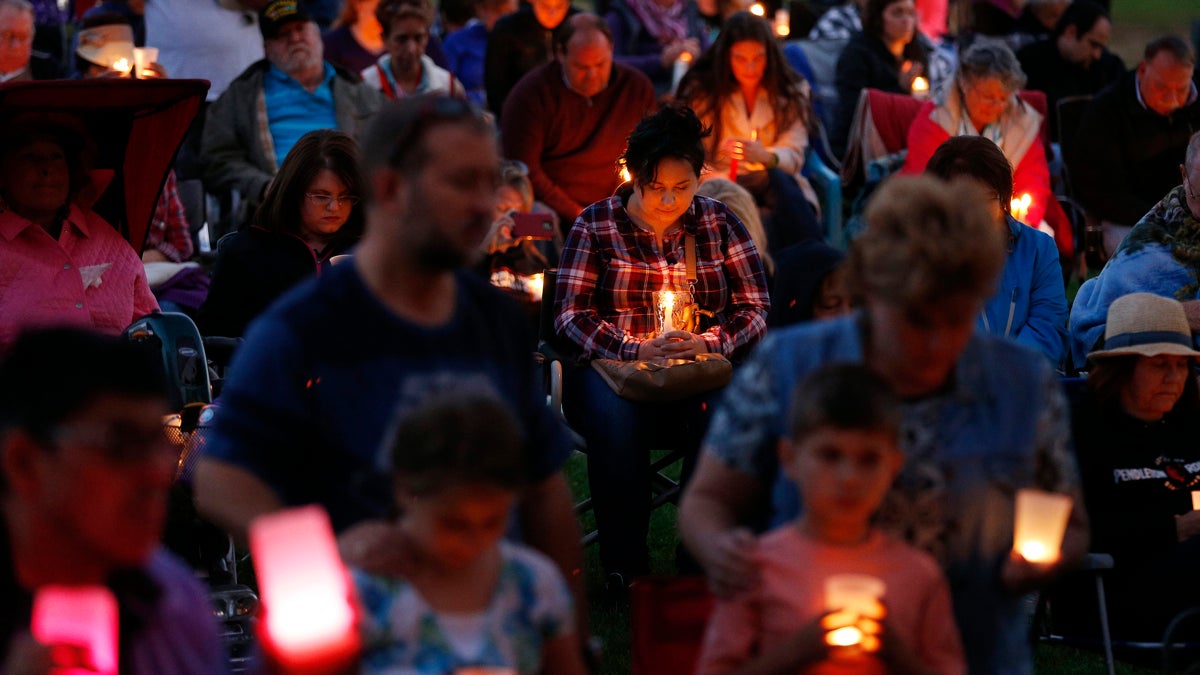When it comes to gun control white lives don’t matter

People bow their heads in prayer during a prayer vigil Saturday, Oct. 3, 2015, in Winston, Ore. The vigil was held in honor of the victims of the fatal shooting at Umpqua Community College on Thursday. (AP Photo/John Locher)
Last week, in the mountains of Oregon, about 180 miles from Portland, a heavily armed gunman walked into classrooms at Umpqua Community College, killing 10 and injuring seven before being killed by police.
Chris Harper Mercer, 26, was in many ways a prototypical mass shooter. White, young and male, he was a disaffected character who’d found himself on the fringe of both society and sanity. In published reports, neighbors described him as a man who was mostly quiet, except for the temper tantrums he threw in the apartment he shared with his mother.
However, when I contemplate this and other mass shootings that have occurred in recent years, it isn’t the shooters’ behavior that strikes me as odd. It’s our response. Because while the police killings of unarmed African Americans have shown that too often, black lives don’t matter, the repeated mass shootings have revealed yet another sad truth: When it comes to the issue of gun control, white lives don’t matter, either.
If white lives mattered, the slaughter of 12 people in an Aurora, Colo., movie theater by James Holmes would have prompted a move toward gun control.
So would the 2007 shooting that killed 30 at Virginia Tech University, or the 2011 shooting that injured then-Congresswoman Gabrielle Giffords, while killing six in Tuscon, Ariz.
If white lives mattered, the 2012 murders of 20 schoolchildren at Sandy Hook Elementary School in Newtown, Conn., would have prompted politicians to change our gun laws. But that was not to be.
In the wake of Sandy Hook, bipartisan legislation that would have expanded background checks, banned assault weapons and banned high-capacity gun magazines all failed to get the 60 votes needed under an agreement between both parties.
The defeat was widely viewed as the death knell for gun control in America.
“There was this great tweet,” Washington Post political reporter Philip Bump told me in a radio interview last week. “The gun fight was lost after someone walked into an elementary school and killed 20 children and nothing changed.”
Nothing changed, in my view, because in America, lives don’t matter. Only money does. And while gun sales are not recorded by dollar figures, the number of guns manufactured annually in America has nearly tripled in three decades, going from 3 million per year in 1986 to 8.5 million per year in 2012, according to the ATF.
The right to buy and sell those guns is protected by a well-heeled gun lobby, led by the National Rifle Association. The NRA leans on the Second Amendment, which gives Americans the right to keep and bear arms, in its quest to keep gun manufacturers sitting pretty.
Their argument, even in the face of mass killings like the one that happened in Oregon, is that the only way to protect Americans from guns is to arm more Americans with guns.
“Does anybody really believe that?” President Obama asked at a press conference following the Oregon shootings. “There is a gun for roughly every man, woman and child in America. So how can you, with a straight face, make the argument that more guns will make us safer?”
The NRA has made that argument, however, and they have been successful in doing so. But when it comes to violence, argues the Washington Post’s Philip Bump, our focus is rarely on guns.
“Over the course of this year so far just in 2015 there have been at least 9,900 deaths due to gun violence,” Bump told me. “That doesn’t even include things like suicides. That’s just someone shooting someone else as a crime. Whereas since the 1970s there have been about 3000 Americans that have died in terrorist attacks, and of course, most of those deaths happened on September 11th. That’s a span of four decades versus a span of 10 months and more than twice as many have died from gun violence.”
Of course, that reality doesn’t change the views of those who believe more guns are the answer. Nor does it change the hearts of those who see guns as their refuge.
Therefore, we watch one mass shooting after another, and speak hollow words about safety. We see the names of victims, and talk disingenuously about the sanctity of life. We see a shooting live on the news, and spout meaningless words about violence.
In truth, none of these things are important enough to prompt change, because when it comes to gun control in America, neither black lives nor white lives matter, and that’s the saddest truth of all.
Listen to Solomon Jones M-F 7 to 10 am on 900 am WURD
WHYY is your source for fact-based, in-depth journalism and information. As a nonprofit organization, we rely on financial support from readers like you. Please give today.


